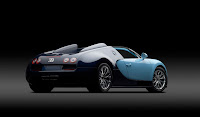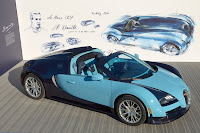Image credits: © Bugatti.
Press Release
Bugatti, a brand with a rich history unique in the car industry, is
celebrating its heroes. The French luxury marque will bring out an
exclusive edition, “Les Légendes de Bugatti” (Bugatti Legends), to
commemorate the renowned names which have played a crucial role in its
history and which have helped creating its mystique. In the 90th
anniversary year of the 24 Heures du Mans, the first Legend is dedicated
to a personality who is central to the history of motor sports and
intimately linked with the Bugatti company: Jean-Pierre Wimille, who
garnered two victories for Bugatti at Le Mans. The Bugatti Legend
“Jean-Pierre Wimille” will make its début in the eyes of the world at
the US The Quail/Pebble Beach weekend taking place from 16 to 18 August.
The next twelve months will see the launch of six individual Bugatti
Legends based on the Bugatti Grand Sport Vitesse.
Dr. Wolfgang Schreiber, President of Bugatti Automobiles S.A.S.:
“This brand has been in large part defined by outstanding personalities
and historically resonant moments. We want to tell the story of the
brand through these Bugatti legends, and at the same time create a link
between its past and presence.”
The Bugatti Legend “Jean-Pierre Wimille” relates to the successes of the
eponymous racing driver who won Bugatti two victories at the 24 Heures
du Mans: in 1937, driving a Bugatti 57G Tank co-piloted by Robert
Benoist, and repeating the feat in 1939, this time supported by Pierre
Veyron in a 57C Tank.
The winning race car from 1937 is the inspiration behind the design
of the “Jean-Pierre Wimille” Bugatti Legend. For the historic race the
57G Tank appeared in the racing blue finish that habitually identified
French racing cars. Accordingly, this Vitesse now shines in blue
clear-coated carbon fibre and a light Wimille Bleu paintwork finish.
The colour scheme is continued in the supercar’s interior, as Achim
Anscheidt, chief designer at Bugatti, explains: “The materials and
colours selected, as well as a host of details, all reference the
essential characteristics of the classic models driven by those figures
to whom our edition pays homage. In each case, this care has resulted in
vehicles in which the authenticity of the past is combined with the
modern design, the sportive superlative and the luxurious comfort of
Bugatti as an icon of the present. With these Bugatti Legends we are
giving history a modern makeover.”
The six Bugatti Legends are all based on the Bugatti Veyron 16.4
Grand Sport Vitesse. This super sports car, launched in Spring 2012, is
officially the fastest series roadster in the world since achieving
408,84 km/h with the top down in April 2013. Centred round an
eight-litre W16 engine delivering 1,200 PS, the Vitesse produces
unequalled maximum torque of 1,500 Nm (at 3,000 – 5,000 rpm), and
accelerates from 0 to 100 km/h in a lightening 2.6 seconds.
The production run for the Bugatti Legend “Jean-Pierre Wimille” will be limited to three vehicles.
About Jean-Pierre Wimille
Jean-Pierre Wimille was one of the longest-serving test drivers at
Bugatti. The son of a journalist, he was born in Paris on 26 February
1908 and drove almost exclusively for Bugatti throughout his racing
career. With a number of victories already under his belt, in 1933
Ettore Bugatti invited him to take up the position of official test
driver for the brand. He joined Bugatti at a point when its last great
racing triumphs lay a few years in the past, making the string of
victories he brought home to Molsheim over the following years even more
significant. In his very first year he came first in the Algerian Grand
Prix, then in 1935 he collected the title in the then-famous hill climb
at La Turbie near Nice driving a T 59, following this with a second
place in the Tunisian Grand Prix and fourth place in Spain.
And it was Jean-Pierre Wimille who brought Bugatti what was to be its
last ever racing number one, in 1947 at the Bois de Boulogne, behind
the wheel of a 4.7 litre Monoposto Type 59/50 B. Wimille was a
world-class driver, who played a key role at Bugatti, especially as the
brand’s racing era came to an end. His greatest racing achievement was
without doubt his twin victories for Bugatti at Le Mans. He died in a
car crash in 1949 in Buenos Aires.



















0 comments:
Post a Comment